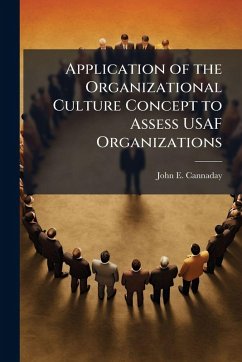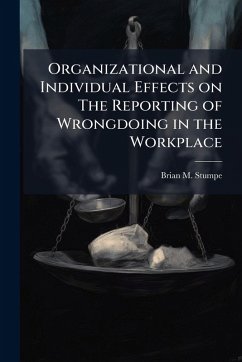
Impact of Organizational Culture on Information Sharing
Versandkostenfrei!
Versandfertig in über 4 Wochen
15,99 €
inkl. MwSt.

PAYBACK Punkte
8 °P sammeln!
A key factor in the failure of the intelligence community is the resistance to information sharing. Organizational culture is an essential link in understanding the resistance to information sharing. Using Edgar Schein's organizational culture model, this paper analyzes the organizational culture of the Department of Homeland Security and the Federal Bureau Investigation with an eye toward how organizational cultures of the Department of Homeland Security and the Federal Bureau impact information sharing. The Department of Homeland Security must identify, understand, and work through the barri...
A key factor in the failure of the intelligence community is the resistance to information sharing. Organizational culture is an essential link in understanding the resistance to information sharing. Using Edgar Schein's organizational culture model, this paper analyzes the organizational culture of the Department of Homeland Security and the Federal Bureau Investigation with an eye toward how organizational cultures of the Department of Homeland Security and the Federal Bureau impact information sharing. The Department of Homeland Security must identify, understand, and work through the barriers of organizational cultures within the intelligence community. Part of creating a culture of information sharing involves changing the way people value information sharing and collaboration by encouraging behaviors that foster sharing and discouraging those that do not. The Department of Homeland Security lacks several key characteristics in building an organizational culture such as a stable membership and shared history. The Department of Homeland Security is a newly structured organization with multiple agencies and departments with diverse missions. The creation of a unified organizational culture within the Department of Homeland Security will take time to develop because of the magnitude and complexity of the organization. In comparison, the Federal Bureau of Investigation was established in 1908 as a law enforcement-centric organization. However, the Federal Bureau of Investigation's Director, Robert Mueller, changed the organization to threat-based and intelligence driven organization after the events of 9/11. The Federal Bureau of Investigation has maintained its organizational culture while undertaking reorganization. The Department of Homeland Security and the Federal Bureau of Investigation have an opportunity to bridge the information sharing gap through the development of joint threat assessments. The Federal Bureau of Investigation and the Department of Homel This work has been selected by scholars as being culturally important, and is part of the knowledge base of civilization as we know it. This work was reproduced from the original artifact, and remains as true to the original work as possible. Therefore, you will see the original copyright references, library stamps (as most of these works have been housed in our most important libraries around the world), and other notations in the work. This work is in the public domain in the United States of America, and possibly other nations. Within the United States, you may freely copy and distribute this work, as no entity (individual or corporate) has a copyright on the body of the work. As a reproduction of a historical artifact, this work may contain missing or blurred pages, poor pictures, errant marks, etc. Scholars believe, and we concur, that this work is important enough to be preserved, reproduced, and made generally available to the public. We appreciate your support of the preservation process, and thank you for being an important part of keeping this knowledge alive and relevant.












